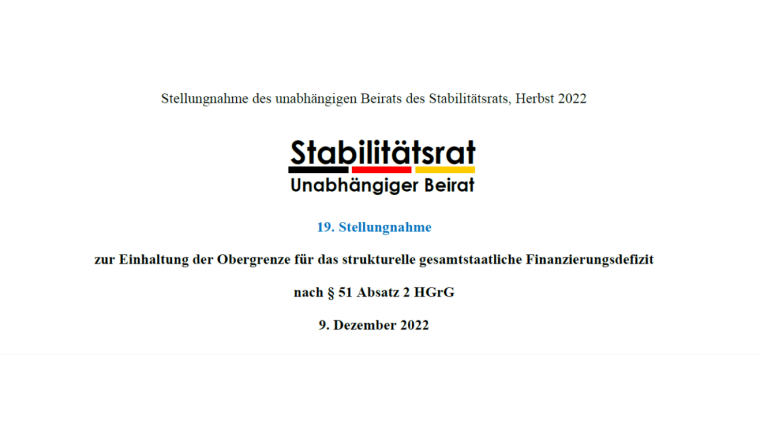
Published:
The Independent Advisory Board to the Stability Council (Unabhängiger Beirat des Stabilitätsrats)External link, of which Silke Übelmesser is a member, published its 19th Statement about the structural government budget deficit.
The main points of the statement are briefly outlined below.
According to the projection of the Federal Ministry of Finance, the structural deficit that Germany has been running since 2020 will widen again significantly to over 3% of GDP next year before the deficit then stabilizes at a level of around 1.5% of GDP.
The Stability Council stated today that the serious deviation from the regular ceiling was in line with the rules. The Council does not agree with this reasoning. It is true that the ceiling for the general government deficit has been suspended throughout the EU this year and next. Nevertheless, there are requirements that are not being met.
First, the structural deficit of over 3% in the following year is too large measured against the EU Commission's recommendation. However, this recommendation is plausible in view of the continuing price pressure. Second, the path shown for the structural deficit is insufficient. In particular, the target of an improvement in the structural balance by 0.5 percent of GDP per year is not met. According to the Council's assessment, the projection shows that Germany is moving toward a plateau of the structural balance of 1.5 percent of economic output. This value is three times higher than the binding upper limit (MTO).
Here it becomes clear that the debt brake no longer ensures compliance with the upper limit for the general government deficit. The federal government, for example, has credit-financed deficit margins effectively outside the debt brake of around EUR 400 billion. There is also a tendency among the states to pre-finance future expenditures via emergency loans. In addition, there are other events that threaten to permanently damage the credibility and binding effect of the debt rules. As examples, the Council mentions the municipal debt assumption in Rhineland-Palatinate and the establishment of a transformation fund in Saarland.
See here External linkfor the press release (in German) and for the 19th Statement (in German).